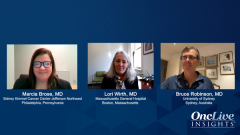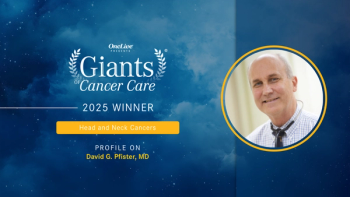
Differentiated Thyroid Cancer: Unmet Needs and Future Directions
Experts highlight remaining unmet needs in the management of radioiodine-refractory differentiated thyroid cancer and share their hopes for the future.
Episodes in this series

Transcript:
Marcia Brose, MD: Thank you both for this rich and informative discussion. Before we conclude, I’d like to get your final thoughts on unmet needs and future perspectives from both of you. Bruce, why don’t you start us out this time and give us your final thoughts.
Bruce Robinson, MD: We’re blessed now to have such a range of TKIs [tyrosine kinase inhibitors] available to us. That’s a great thing because when you compare the situation now to what we had 10 years ago, we’re very fortunate. There is more work to be done, and obviously new TKIs will be developed by other pharmaceutical companies. But I also think there’s a lot of interest in redifferentiation therapy as well. Whether something comes of that, time will tell. That’s the other kid on the block, so to speak, and one that is being evaluated in a number of centers around the world.
Marcia Brose, MD: Wonderful. How about you, Lori?
Lori Wirth, MD: One puzzle that we don’t know the answer to is what are the mechanisms of disease progression on these TKIs. We know a lot about and we’re learning a lot about the acquired resistance mechanisms on the gene-specific therapies like the TREK inhibitors or the RET inhibitors. Then it becomes easy to design drugs based on those mechanisms that arise. But we don’t know why patients respond so well to a drug like lenvatinib, and then why they ultimately begin to progress. I’d like one of you 2 to figure that out, please.
Marcia Brose, MD: We’ll put it on the menu. I agree, and the other area, I won’t say we haven’t tried, because you just described Lori the trial with pembrolizumab, but we really haven’t seen the success with immunotherapy that has been seen in other cancers. Maybe it’s just that we haven’t figured out the right combination of mechanisms to target with immunotherapy. It may end up being that some of the combination trials down the line will show some more activity in thyroid cancer. But that’s been a bit of a disappointment. It would be nice if we could figure out how we could do that, whether it’s a question of a certain combination. With preclinical data, it did look like if you treated some cells with a kinase inhibitor and then gave the immunotherapy, that would work. At least the initial results that were presented for the first-line lenvatinib and pembrolizumab were disappointing. But it may have been a hard bar to jump because we had already a very good agent. I think the second trial made more sense because the follow-on is what you do when that extra wonderful agent is not quite doing as well. And maybe we just haven’t found the right context for harnessing the power of immunotherapy. That’ll be interesting to see if that develops as well. I’ll expect the results out of both of you on that.
Anyway, thank you both once again, Lori and Bruce, for this insightful discussion. And to our viewing audience, thank you for joining us. We hope you found this OncLive® My Treatment Approach program to be useful and valuable to the management of your patients with thyroid cancer. Thank you very much.
Transcript edited for clarity.



































